It’s review week at Makom Community! We can hardly believe that we’re already a quarter of the way through our school year together.
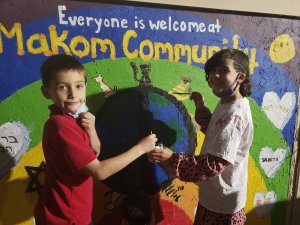
The Garinim (kindergartners) spent last week revisiting the text from our first unit and brainstorming ideas for our classroom brit (two-way promise) from those texts. Here’s some of our ideas.
From Leviticus 19:17-18, “You will not hate your sibling in your heart. Gently scold your relatives, but don’t take on their mistakes. Don’t hold a grudge against the people of your country. Love your neighbor as yourself: I am God.”
- Hold our anger in; be kind to people instead.
- Move through our anger because if we hold onto it then people might notice and not want to play with you.
- We will make mistakes and then…
- Offer hugs or try to make the other person feel better.
- Don’t repeat others’ mistakes
- Respond kindly
- We should be loving and kind even when it’s hard
From Pirkei Avot 1:14, “Rabbi Hillel used to say: If I am not for myself, who is for me? But if I am for my own self only, what am I? And if not now, when?”
- We take responsibility for ourselves by
- Following the rules
- Listening to the teacher
- Asking for what we need
- Noticing what we need and getting it ourselves
- We take responsibility and care for each other by
- Sharing
- Using polite and kind words
- Paying attention to each other’s feelings and offering help and compassion
From Pirkei Avot 2:4, “Hillel said: do not separate yourself from the community. Do not judge your fellow until you have reached their place. Do not say something that cannot be understood [trusting] that in the end it will be understood.”
- Stay together so you don’t get lost.
- Be kind.
- Be responsible and don’t judge your fellow.
- Tell someone when they have upset us, apologize when we upset someone, and tell a teacher when we need more help.
We have been so inspired by the mural painted by Nitzanim and kiddos drafted backgrounds that included rainbows, suns, flowers, people, the Makom Community signpost symbol, and construction tools. As we finalize our brit, we’re looking forward to exploring how we can combine our designs in a way to best represent the “Love Your Neighbor” theme to us.
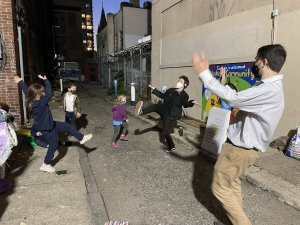
On Monday, the Shorashim started off recounting major themes from Jewish Enrichment so far. “Treat others as you want to be treated” was one particular takeaway. Then, we tried to remember all 15 of the books we had read. At first, it was hard to remember what we’d read, but once we got going, kids were able to remember the core themes. In some cases, while we remembered a character or event in a book differently from how it actually happened, we still remembered the overall theme. (For example, the wise octopus in The Rainbow Fish was remembered as “God.”) We then gathered on the carpet to brainstorm the points on our brit. Kiddos really took their time and we are so impressed with the list they came up with.
Possible brit shapes that were named included:
- A house with a heart in the middle
- A birds nest with ornaments coming out the bottom
- A large cat with kittens all around it
- Just a large cat
- Dinosaur
- Unicorn
On Tuesday, we reviewed the fall Jewish holidays! We remembered that Rosh Hashanah is the Jewish New Year and includes the shofar and apples and honey. Yom Kippur might include asking for forgiveness, tashlich, and fasting, Sukkot includes the sukkah, in which one might eat, sleep, and shake the lulav and etrog, and Simchat Torah, when we dance with the Torah as it starts over. We played a Jeopardy-style game where kids recounted facts from the unit and did group challenges.
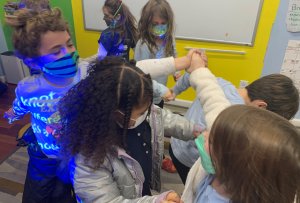
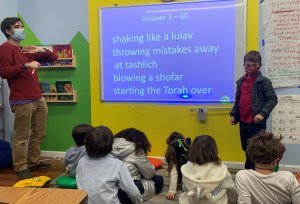
On Wednesday, we considered whether the following were neighbors or strangers:
- Your teacher
- Your parents
- Your best friend
- Your grandparents
- Your more extended family
- Your Makom teachers
- Other Makom teachers
- Your parents’ friends
- The people who live on your street
- The driver of your bus
There was a variety of opinions for each one of these, with many suggesting that “relatives” should be its own category. One particular insight that kids raised was that understanding someone’s traditions or culture (i.e. the traditions of a particular neighborhood) might be a big part of whether you can consider them neighbors or strangers. Another was that “trust” is a big part of what makes someone a neighbor or a stranger.
On Thursday, kiddos completed a Torah service bingo sheet as they watched BMitzvah read from the Torah.
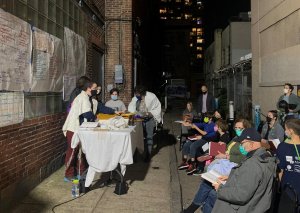
Nitzanim began reviewing texts and ideas that we’ve been discussing throughout our unit of “Love Your Neighbor.” As our unit comes to an end, we’re getting a start on using ideas from our texts and Jewish learning to form our class brit. This brit, or two-way promise will be a list of expectations for our kevutzah to be painted somewhere in our classroom.
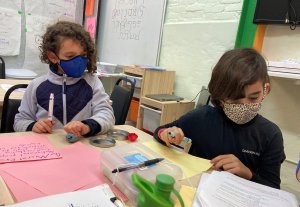
Referencing this text from Leviticus: “When a stranger resides with you in your land, you shall not wrong them” we came up with a couple expectations to add to our brit:
- Empathy: assume the best in people
- Help people when they are in need
On Tuesday, we returned to an Ecclestiastes text which reads: “Two are better off than one, in that they have greater benefit from their earnings. For should they fall, one can raise the other; but woe betide one who is alone and falls with no companion to raise them!” To add to our brit, this is what we brainstormed:
- Cheer someone up if they feel down
- Treat our space kindly
Our showcase is on Friday, November 19! Nitzanim has been busy preparing for the night our grownups get to see all our hard work. Some things we’re excited for: Walking our grownups through the space, setting up the tables to show off our process, and serving mac n cheese at the end.
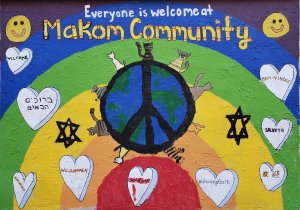
The next time we gather, educators will be introducing our next Unit and reviewing the story of Chanukah. We hope you have a relaxing Thanksgiving gathering with your loved ones!
